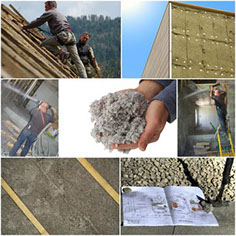Allowing the weather into your home through air leaks can cause an abundance of issues including health problems, structural problems to the home and comfort level issues. Here are five impacts of good insulation in your home:
 Stay Warmer in the Winter and Cooler in the Summer
Stay Warmer in the Winter and Cooler in the SummerThe amount of insulation that you put into your home and the type of insulation used play a key role in insuring that your home is warm all winter and cool in the summer. Some products work better then others depending on the R-value of the product. The R-Value is a measure of thermal resistance, and is used to determine how well the product insulates. The more the product insulates and protects, the higher the R-Value. Asking an insulation specialist, such as one from the S & E team, about specific R-Values can help you determine what course of action is best for your home and your family.
Structural Damage to Your Home
By trapping pockets of air and slowing down the in/out process, insulation keeps the out door air from seeping into your home and the indoor air from seeping out. By reducing the number of trapped air pockets and leaks you have in a home, you are reducing the chances of moisture from being trapped in the structure of your home causing damage and mold. A good way to find out exactly where air pockets and leaks are located is by having an Energy Audit completed by a professional auditor. An auditor will use a number of resources and tools to find the leaks and pockets creating a plan for the insulation team. The Department of Energy has an entire page dedicated to the importance and facts about an energy audit that you can find here.
Improved Air Quality
When you have properly insulated your home, you are protecting your home from outside allergens and pollutants that can result in indoor air quality problems. The cleanliness of the air inside of your home is determined by the air flow and conditions which the air moves around. Advancements in HVAC (Heating, Ventilation, and Air Conditioning) systems can help to improve the air quality along with good insulation. When the air quality is poor, families can notice a decline in their respiratory health with issues such as breathing problems, coughing, sneezing and worsened asthma symptoms.
Reduction of Drafts
Another cause for concern that can be reduced by properly insulating your home is drafts through out the space. A draft can cause issues with health and structural damage to the home if moisture comes in through the draft. Nothing worse then cuddling in your favorite chair only to feel a ice cold breeze every few minutes because your home is lacking insulation around a window, door or outlet.
Improved insulation Saves Money
Loss of energy equals loss of dollars. As heating and air conditioned air seeps through the leaks in the home, it forces the HVAC system to work harder to keep up with the loss. Good quality insulation that has been professionally installed to prevent air leaks can reduce home energy by as much as 40% depending on the type of insulation and the R-Value. To learn the variables that come with the different types of insulation product and R-Values, you should contact a professional insulation company such as S & E Insulation. Our staff is fully trained on the latest in products and ratings to help you make a money saving choice for your future.
